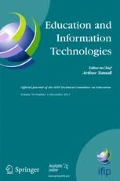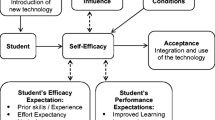Abstract
The purpose of this mixed-methods study was to compare the expectations and fulfillment of undergraduate students enrolled in a skills class that utilized iPads in the classroom. Pre- and post-surveys were administered to students at the beginning and end of the semester. A series of t-tests (n = 78) showed the tablet did not meet their expectations in terms of course engagement and benefits/skills they anticipated receiving from class activities and coursework. However, their non-academic use of the iPad, for both entertainment and social media purposes, was higher than they predicted. The qualitative portion of the study resulted in three themes: acceptance of tablet technology, student excitement and engagement, and how teacher preparation and proficiency with the technology affects classroom usage. This study suggests a need for teacher training in application selection and ample in-class device usage.
Similar content being viewed by others
References
Armstrong, D. A. (2011). Students’ perceptions of online learning and instructional tools: a qualitative study of undergraduate students use of online tools. Turkish Online Journal of Educational Technology - TOJET, 10(3), 222–226.
Burden, K., Hopkins, P., Male, T., Martin, S., & Trala, C. (2012). iPad Scotland evaluation (final evaluation report). Faculty of Education, University of Hull. Retrieved February 10, 2016 from http://www.janhylen.se/wp-content/uploads/2013/01/Skottland.pdf.
Butcher, J. (2014). Can tablet computers enhance learning in further education? Journal of Further and Higher Education. doi:10.1080/0309877X.2014.938267.
Chan-Olmsted, S., Rim, H., & Zerba, A. (2013). Mobile news adoption among young adults: examining the roles of perceptions, news consumption, and media usage. Journalism & Mass Communication Quarterly, 90(1), 126–147.
Chickering, A. W., & Gamson, Z. F. (1987). Seven principles for good practice in undergraduate education. American Association of Higher Education Bulletin, 39(7), 3–7.
Creswell, J. (2003). Research design: Qualitative, quantitative, and mixed methods approach (2nd ed.). Thousand Oaks: Sage.
Davis, F. D. (1989). Perceived usefulness, perceived ease of use, and user acceptance of information technology. MIS Quarterly, 13(3), 319–340.
Davis, F. D., Bagozzi, R. D., & Warshaw, P. R. (1989). User acceptance of computer technology: a comparison of two theoretical models. Management Science, 35(8), 982–1003.
de Winter, J., Winterbottom, M., & Wilson, E. (2010). Developing a user guide to integrating new technologies in science teaching and learning: teachers’ and pupils’ perceptions of their affordances. Technology, Pedagogy & Education, 19(2), 261–267. doi:10.1080/1475939x.2010.491237.
Efaw, J., Hampton, S., Martinez, S., & Smith, S. (2004). Miracle or menace: teaching and learning with laptop computers in the classroom. Educause Quarterly, 27(3), 10–19.
Fischer, N., Smolnik, S., & Galletta, D. (2013). Examining the potential for tablet use in a higher education context. In Proceedings of the 11th international conference on Wirtschaftsinformatik, Feb. 21-march 1, Leipzig, Germany (pp. 9–22).
Grinols, A.B. & Rajesh, R. (2014). Multitasking with smartphones in the college classroom. Business and Professional Communication Quarterly, 77, 89–95.
Kothaneth, S., Robinson, A., & Amelink, C. (2012). Tablet pc support of students’ learning styles. Journal of Systemics, 10(6), 60–63.
Ludwig, L., Mayrberger, K., & Weidmann, A. (2011). Einsatz personalisierter iPads im Unterricht aus Perspektive der Schülerinnen und Schüler. In S. Friedrich, A. Kienle, & H. Rohland (Eds.), DeLFI 2011: Die 9. eLearning Fachtangung Informarik (pp. 7–17). Dreseden: TUDpress.
Meierdiercks, K. (2005). The dark side of the laptop university. Journal of Information Ethics, 14(1), 9–11.
Melhuish, K. & Falloon, G. (2010). Looking to the future: M-learning with the iPad. Computers in New Zealand Schools: Learning, Leading, Technology, 22(3).
Miller, W. (2012). Iteaching and learning: collegiate instruction incorporating mobile tablets. Library Technology Reports, 48(8), 54.
Pearson Student Mobile Device Survey (2014). National report: college students. Rochester, NY: Harris Poll.
Pereira, F., Ramos, A., Gouvea, M., & da Costa, M. (2015). Satisfaction and continuous use intention of e-learning service in brazilian public organizations. Computers in Human Behavior, 46, 139–148.
Porter, C., & Donthu, N. (2006). Using the technology acceptance model to explain how attitudes determine internet usage: the role of perceived access barriers and demographics. Journal of Business Research, 59(9), 999–1007.
Price, F., & Kadi-Hanifi (2010). E-motivation! The role of popular technology in student motivation and retention. Research in Post-Compulsory Education, 16(2), 73–87.
Puentedura, R. R. (2010). SAMR and TPCK: Intro to advanced practice. Ruben R. Puentedura’s Weblog. Retrieved June 1, 2016 from http://hippasus.com/resourcessweeden2010/SAMR_TPCK_IntroToAdvancedPractice.pdf.
Rikala, J., Vesisenaho, M., & Mylläri, J. (2013). Actual and potential pedagogical use of tablets in schools. Human Technology, 9(2), 113–131.
Rossing, J. P., Miller, W. M., Cecil, A. K., & Stamper, S. E. (2012). iLearning: the future of higher education? Student perceptions on learning with mobile tablets. Journal Of The Scholarship Of Teaching & Learning, 12(2), 1–26.
Shepherd, I., & Reeves, B. (2011). iPad or iFad–The reality of a paperless classroom. Paper presented at the Mobility Conference, Abilene Christian University. Retrieved March 15, 2016 from http://www.acu.edu/legacy/technology/mobilelearning/documents/research/shepherd-reeves/paperless-classroom.pdf.
Shuler, P., Hutchins, G., & LaShell, B. (2010). Student perceptions of tablet computers in a cooperative learning environment. NACTA Journal, 54(2), 11–17.
Skiba, D. J. (2011). On the horizon mobile devices: ae they a distraction or another learning tool? Nursing Ecuation Perspectives, 32, 195–197.
Sullivan, R. (2013). Writing instruction with the iPad. College Teaching, 61(1), 1–2.
Tan, P. (2015). English e-learning in the virtual classroom and the factors that influence esl (english as a second language): Taiwanese citizens’ acceptance and use of the modular object-oriented dynamic learning environment. Social Science Information Sur Les Sciences Sociales, 54(2), 211–228.
Venkatesh, V., Morris, M. G., Davis, G. B., & Davis, F. D. (2003). User acceptance of information technology: toward a unified view. MIS Quarterly, 27(3).
Vesisenaho, M., & Dillon, P. (2013). Localizing and contextualizing information and communication technology in education: a cultural ecological framework. Pedagogy, Culture & Society, 21(2), 239–259.
Wang, R., Wiesemes, R., & Gibbons, C. (2012). Developing digital fluency through ubiquitous mobile devices: findings from a small-scale study. Computers & Education, 58(1), 570–578. doi:10.1016/j.compedu.2011.04.013.
Westervelt, E. (2013). A school’s iPad initiative brings optimism and skepticism. NPR. http://www.npr.org/blogs/alltechconsidered/2013/10/25/240731070/a-schools-ipad-initiative-brings-optimism-and-skepticism.
Young, J. R. (2006). The fight for classroom attention: professor vs. laptop. Chronicle of Higher Education, 52(39), A27–A29.
Author information
Authors and Affiliations
Corresponding author
Rights and permissions
About this article
Cite this article
Bluestein, S.A., Kim, T. Expectations and fulfillment of course engagement, gained skills, and non-academic usage of college students utilizing tablets in an undergraduate skills course. Educ Inf Technol 22, 1757–1770 (2017). https://doi.org/10.1007/s10639-016-9515-8
Published:
Issue Date:
DOI: https://doi.org/10.1007/s10639-016-9515-8




